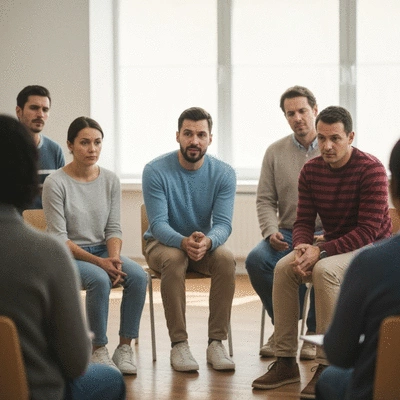Encouraging Others & Community Building
Sharing stories provides encouragement, creates a sense of belonging, and demonstrates faith in action within the community.
Welcome to The Upper Room DFW – your guide to finding a spiritual home!
Oct 21
What if your story could not only heal you but also empower those around you? Sharing personal testimonies is a transformative act that connects communities and fosters spiritual growth. Let's delve into the essential lessons from this powerful practice.
Discover the profound impact of personal testimonies on spiritual growth, community building, and mental wellness. This visual highlights key aspects of sharing your journey.
Sharing stories provides encouragement, creates a sense of belonging, and demonstrates faith in action within the community.
Focusing on universal themes connects experiences, fosters dialogue, and highlights faith's transformative power.
Honest storytelling builds trust, encourages vulnerability, and creates a safe space for mutual understanding and support.
Testimonies validate feelings, provide community support, encourage reflection, and empower individuals through storytelling.
Have you ever thought about how powerful it can be to share your story? Sharing personal testimonies is not just a way to reflect on our journeys; it's a crucial element for spiritual growth and fostering connections within our communities. At The Upper Room DFW, we believe that when individuals share their experiences, they create a tapestry of faith that others can resonate with, learn from, and be inspired by.
When we open up about our struggles and triumphs, we invite others to join us in understanding our faith journeys. This act of storytelling can lead to transformative experiences that deepen our spiritual lives and help us feel more connected to those around us.
So, why is sharing our testimonies so essential? It’s about more than just recounting events; it’s about connecting with other people on a deeper level. By sharing our stories, we provide a mirror for others, reflecting their own experiences and struggles. Here are a few key reasons why sharing is vital:
At The Upper Room DFW, we see firsthand how these shared experiences lead to deeper bonds within our local congregations. It’s a beautiful way to build a faith community where everyone feels supported and understood!
When crafting a testimony, it’s beneficial to tap into universal themes that resonate widely, such as love, forgiveness, and personal identity. These elements serve as bridges that connect our unique stories to the broader human experience. In my own journey, I’ve noticed how themes of forgiveness can transform not only individual lives but entire communities.
These themes not only captivate the audience’s attention but also encourage open dialogue within the community, reminding us all that we share more in common than we might think!
Authenticity is key when it comes to sharing testimonies. People connect with truth, and they can often tell when a story feels rehearsed or insincere. By being honest about our experiences—both the highs and the lows—we foster an environment of trust. At The Upper Room DFW, we encourage our community to share their authentic selves, as this is where real connections happen.
When you speak from the heart and share your genuine experiences, you strengthen the impact of your testimony. Authenticity isn’t just about being truthful; it’s about being vulnerable and open, which resonates deeply with others.
Trust and vulnerability are intertwined in storytelling. They create a safe space for others to open up, too. When you share your challenges and uncertainties, you invite others to do the same, paving the way for mutual understanding and support. Here’s how you can establish that trust:
As we build these narratives together, we form stronger community ties, which is precisely what The Upper Room DFW aims to promote—an inclusive space where everyone feels empowered to share their journey. Additionally, exploring resources from organizations like National Disability Rights Network can offer valuable perspectives on how storytelling fosters advocacy and understanding within diverse communities.
Creating a compelling testimony doesn't have to be daunting. With the right approach, anyone can share their story in a way that resonates. Let’s explore some practical steps to help you craft your personal narrative effectively.
When crafting your personal testimony, consider including a specific moment that encapsulates your journey. This could be a turning point or a moment of realization that deeply impacted your faith. Sharing these pivotal experiences can make your story more relatable and memorable, encouraging others to reflect on their own transformative moments.
Have you ever thought about how sharing your story can impact not just your spirit, but also your mental health? At The Upper Room DFW, we believe there’s a profound connection between sharing testimonies and experiencing emotional healing. Testimonies can serve as powerful tools for personal reflection and growth, promoting mental wellness through the simple act of storytelling.
By expressing our experiences and struggles, we create pathways for understanding and healing. It’s not just about recounting events; it’s about connecting with ourselves and each other in meaningful ways that foster growth and resilience.
Sharing personal stories is more than just a cathartic exercise; it can actually contribute significantly to emotional healing and mental health support. Let’s explore how this process unfolds:
Through sharing, we not only heal ourselves but also inspire and uplift those around us. It's a beautiful cycle of connection and support that strengthens our community. For further insights on the power of narrative in personal development, resources from organizations like ASCD (Association for Supervision and Curriculum Development) often highlight the importance of storytelling in fostering understanding and growth.
Here are some common questions about the practice of sharing personal testimonies and their impact:
Now that we’ve highlighted the importance of personal testimonies, I invite you to reflect on your own experiences. Have you faced challenges that led to growth? It might be time to consider sharing your story within your community or church. Sharing doesn’t have to be daunting; it can be a rewarding opportunity to connect with others who may be facing similar circumstances.
By opening up and sharing, you might discover a newfound sense of purpose and connection. Remember, every story matters, and yours might just be the one that resonates with someone in need!
Everyone faces obstacles—it's part of the human experience. Sharing stories of overcoming adversity has the potential to inspire and empower others who find themselves in similar situations. Here are some powerful themes to consider when thinking about your own narrative:
When we share our challenges and triumphs, we create a tapestry of support that fosters resilience in our community, helping others feel empowered to face their own battles.
As we wrap up this section, I encourage you to think about the key points we've discussed. Testimonies are not only vehicles for personal growth but also for community healing. I invite you to engage with your local church or community group, perhaps through The Upper Room DFW, to share your story and listen to others. Together, we can cultivate a community that thrives on shared experiences, support, and love.
So, what’s your story? Take that step forward and share it—you might just be amazed at the impact it has!
Here is a quick recap of the important points discussed in the article:
Passionate advocate for faith-based communities. Dedicated to fostering connections among local congregations.
MICHAEL K is dedicated to helping individuals and families find their spiritual home in the DFW metroplex, nurturing vibrant community ties. Join her on our blog for insights and connections that simplify your search and enhance your faith journey.
Passionate advocate for faith-based communities. Nurturer of community ties.
Evelyn Thatcher is dedicated to fostering connections among local congregations in the Dallas-Fort Worth area, ensuring everyone finds a spiritual home that resonates with their beliefs and values. Through The Upper Room DFW, she empowers the faith community to discover diverse worship venues and community engagement opportunities. Join her on our blog for insights and stories that uplift and enrich your faith journey and enhance your sense of belonging.


